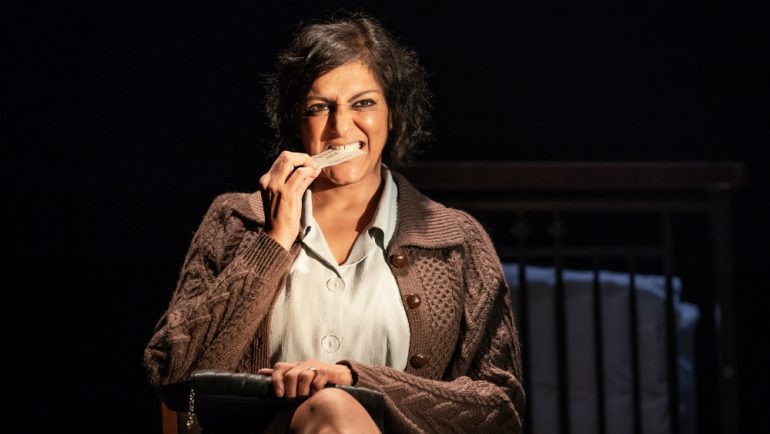West End Review: ‘Pinter Three and Four’
By Matt Trueman
LOS ANGELES (Variety.com) – “Pinter at the Pinter” is not merely completist, it’s meticulously curated. A decade after Harold Pinter’s death, director Jamie Lloyd’s six-month season of the writer’s short plays and sketches looks past chronology to tease out recurring themes. It could be disjointed. Instead, it’s illuminating, shining a light on Pinter’s preoccupations. The first set was political, raging against regimes. The second is philosophical, riven with existential angst. It circles the notion that other people are both unreachable and unknowable — as, indeed, we are ourselves.
“Pinter Three” is the more patchwork, its theme surfacing slowly. In “Landscape” (1969), Tamsin Greig stares ahead and speaks softly into a microphone, lost in a memory of a young lover snoozing on a sandy beach. He may or may not be her husband, now sat, middle-aged, blathering on about the banalities of his day: rain, sleeplessness, work, work, work. Keith Allen bats a barrage of idle half-thoughts her way, speaking just to stave off silence, but Greig’s impervious, faraway, smiling a watery smile. There’s a gulf between them, but it’s nothing compared to the distance between their past and present selves. Pinter makes marriage seem like a cosmic joke: a gradual process of drifting apart until, decades later, you find yourself tied to a stranger, someone you once both loved and knew.
That the same actors recur in “A Kind of Alaska” — Greig waking up from a coma convinced she’s still 16, Allen as the doctor caring for and controlling her — ties the two shorts together. Alaska’s age-gap echoes the temporal split of “Landscape,” and Lloyd draws a line between marital and patient-doctor relationships, implying an imbalanced power dynamic that infantilizes women as wives. After all, Allen’s chilly clinician has kept his patient comatose for 29 years, preserving her in “a kind of Alaska.” His frosty relationship with his wife (Meera Syal) suggests it’s a surrogate of sorts, one that (as in “Landscape”) puts work before love.
Between the two, Pinter’s revue sketches become a carousel of lonely souls. As designer Soutra Gilmour’s stage slowly rotates, actors stand alone in its frames, staring off in solitary contemplation. Like Allen in “Landscape,” they talk to kill time. In “Monologue” (1973), the elastic Lee Evans reminisces with an empty chair, brewing an argument all on his own. There are barroom bores arguing in “That’s Your Trouble” (1959), and gossiping old dears in “That’s All” (1959). Strikingly, Lloyd often adds still, silent listeners, half tuned-in, half zoned out. Allen leans on the bar, bored out of his brains; Tom Edden sits, almost comatose, as the housewives natter.
The sketches are, inevitably, uneven, but Lloyd’s aware of what needs playing up by a cast of natural born clowns. Yet “Pinter Three” showcases the writer’s knack for linguistic inanities — from the ludicrous industrial terms of “Trouble in the Works” (1959) to the nonsensical patter of salesmen, stand-ups and street preachers. He has a sharp comic ear.
It’s more than technique. The sense is of people desperate to connect; of words sprayed like radio waves into space or radar signals seeking surfaces to bounce off. Pinter’s characters are isolated motormouths, chattering to stop themselves sliding into the abyss, or else they’re silent, lost to the world. There is, perhaps, a peace to be found there, as the lapping waves of Ben and Max Ringham’s soundscape suggest contented solitude. “It’s a fact of life,” says Evans in “Monologue,” “the ones that keep silent are the best off.”
In “Moonlight,” a belligerent man rails against death. Tucked up in bed, Robert Glenister’s Andy will not go quietly into the night. With his wife (Brid Brennan) sat sewing by his side, perhaps out of sympathy, perhaps waiting for release, he’s variously virile, cruel, playful and meek. He stands up to death, then cowers at its approach, and he clutches to make some sense of his life. What does his civil service career count for? What does he leave behind? Two sons, a dead daughter, a wife — what else? What if he married the wrong woman? Who was he? “The past is a mist.”
It’s a strange swirl of a play, and director Lyndsey Turner’s staging gives it a trippy twist. Scenes slip and slide, not quite as smoothly as they might, and people melt into the walls. It’s never quite naturalistic, but nor is it not. Glenister’s superb: imperious, belligerent, stricken with panic. His sons — Al Weaver and Dwane Walcott are a perfectly Pinteresque double act — wear bright colored suits that put the fun into funeral and Gilmour’s design, stages in stages, suggests we’re all protagonists of our own lives, incapable of seeing the story in full. We are unknowable, even to ourselves.
It’s a point the slighter “Night School” picks up, as gunman Walter returns from prison to find his room rented out. His dotty aunts are dewy-eyed for their charming young lodger Sally, a schoolteacher taking late-night language lessons. She’s not all she seems.
Written for television, it sits awkwardly onstage, and while Edward Stambollouian’s dapper production distracts from its faults, it can’t disguise them. Short scenes cut out, the action never boils over, even with a live drummer (Abbie Finn) bashing out some sense of its pulse. Brennan and Janie Dee have a blast as the two bosomy aunts, cooking up endless cakey treats and eavesdropping for nocturnal activity, but while Weaver’s sweet-hearted small-time criminal and Jessica Barden’s inscrutable, innocent escort make clear that appearances aren’t everything, “Night School” has more swagger than substance.

